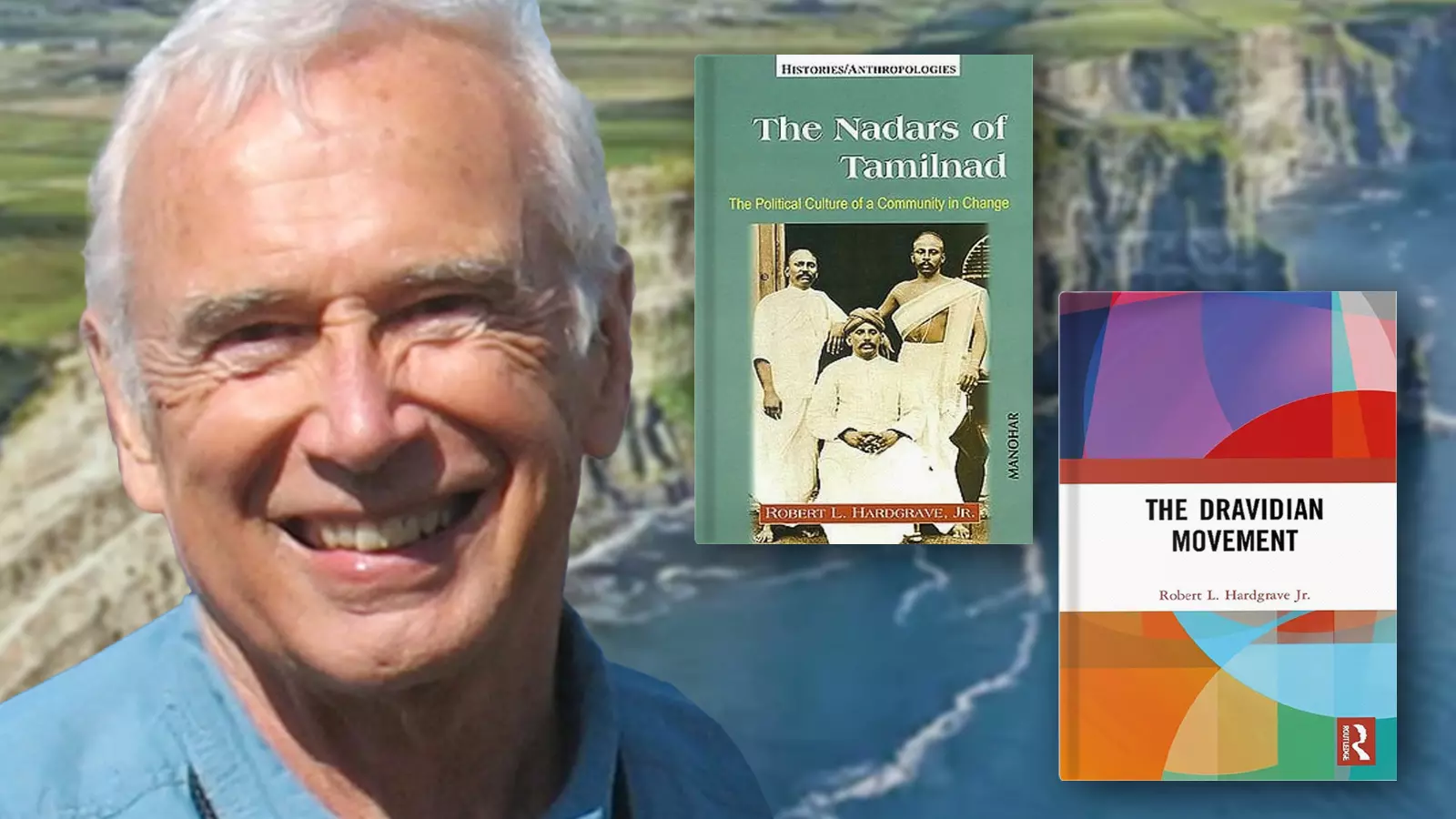
Robert L Hardgrave: American scholar who closely followed Dravidian movement
Hardgrave’s work on Nadars and Dravidian parties have become 'canonical readings' for historians, sociologists and political scientists

For all who have studied the history of modern Tamil Nadu in general, and about the Dravidian Movement in particular, Robert L Hardgrave Jr. will be a familiar name. This American academic, who passed away recently, is known even after 50 years, for his in-depth research on the Dravidian movement that "traditionalised the political process" in the then Madras. Moreover, Hardgrave continues to inspire and influence even over the new breed of historians.
Hardgrave, a Louann and Larry Temple Centennial Professor Emeritus in the humanities, departments of government and Asian Studies at the University of Texas at Austin, died recently due to age-related ailments in the USA. The news of his demise reached a few of his friends in India a few days ago. It is said that the delay was because he died alone and had no survivors.
Born in 1939, Hardgrave first came to South India in 1960. However, he came in touch with the Dravidian Movement two years earlier as an under-graduate at the University of Texas at Austin.
He had registered for a course on Indian government and politics. While searching for the articles required for the course, he found occasional references to the Dravida Kazhagam (DK) and the Dravida Munnetra Kazhagam (DMK) and that was his first encounter with the politics of South India.
'Systematically ignored movement'
While writing in his book Essays in the Political Sociology of South India (1979), he said that since the articles he came across failed to yield much information on either political party, he was intrigued to find out more.
"A search through ten years of The Hindu on microfilm turned up very little on either party. That the Tamil nationalist movement should be so systematically ignored seemed curious indeed," he had said.
Since Hardgrave wanted to specialise in South Asia for his graduate work in political science, he wanted to visit India before dedicating his academic life to the country. So, he came to India for a year.
"My purpose was to "experience" India, to get a feel of its culture, society, and politics. I did not go to do research, but I felt that a project on the Dravidian movement would give me a point of penetration. I arrived an academic innocent. What I lacked in methodological and theoretical sophistication, I tried to make up for in enthusiasm," he said.
Capturing social change
In 1961, Hardgrave returned to the US, to begin his graduate study in political science at the University of Chicago, where he later pursued his doctoral degree as well. During his time at the university's South Asia area studies programme, he came in touch with professors like Milton Singer and AK Ramanujan. He even studied Tamil from Ramanujan.
In 1964, he returned to India for his Ph.D. dissertation fieldwork.
"Tamil Nadu was my destination – this time with some knowledge of the Tamil language and a research design in hand. I was interested in the relationship of politics and social change, and I sought to examine the experience of a single caste community, the Nadars," he said. The reason why he zeroed in on the Nadars was as he said, "the Nadars, in two hundred years of social change, encapsulate the experience of many Indian communities in dramatic form". His research later published as a book was titled The Nadars of Tamilnad: The Political Culture of a Community in Change.
Commenting on the book, Dr Karthick Ram Manoharan, assistant professor, social sciences, National Law School of India University said, "Prof Hardgrave's work on the Nadars is an exemplary work of scholarship, which highlights the journey of the Nadar caste through modernity and how they came to constitute an important political force in Tamil Nadu."
While Hardgrave's objective is to present the complex dynamics of caste, he writes in a rich style that appeals beyond academia, he added.
"The sections on the Sivakasi riots and the Kamuthi conflict are so grippingly written that they can be used as story ideas for a film. His work on the Nadars and his other writings on the Dravidian Movement have become canonical readings for historians, anthropologists, sociologists and political scientists working on Tamil Nadu," said Karthick Ram Manoharan.
An ardent fan of Sivaji Ganesan
In the year 1964-1965, he witnessed serious rioting on the ground over the issue of the Hindi imposition. Once, he even found himself right in the middle of a stand-off between students and the police in Tirunelveli.
During his time in India, Hardgrave developed a taste for Indian films and while working on his dissertation he watched many Tamil films and became a fan of yesteryear star, Sivaji Ganesan. "I had met Sivaji in 1962, when we visited Chicago. It was the beginning of a friendship we were to renew, when I returned to Madras in 1969 to study Tamil film," wrote Hardgrave. For his study on Tamil films he interviewed stars including MGR, besides filmmakers, producers, film journalists and fan clubs.
Theodore Baskaran said that he came in touch with Hardgrave through his writings on Tamil cinema in journals like Economic and Political Weekly. Baskaran, who did a detailed interview with Hardgrave for the now-defunct Tamil magazine Subhamangala in the mid-90s, said he was also an avid birdwatcher.
"When I was the director of the Roja Muthiah Research Library in Chennai, he gave copies of all his film project interviews and also his collection of photos and film posters, pamphlets, publications, etc., to the library," he recalled. And, that shows his generous spirit of wanting to share his knowledge of subjects close to his heart.

